|
|
|
Sort Order |
|
|
|
Items / Page
|
|
|
|
|
|
|
| Srl | Item |
| 1 |
ID:
053641
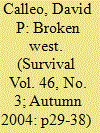

|
|
|
|
|
| Publication |
2004.
|
| Description |
p29-38
|
| Summary/Abstract |
Deep political fissures have opened in the West. Contending visions of the future have arisen on each side of the Atlantic. America, driven by its outsize military and economic strength, has developed a unipolar, hegemonic vision of the future. Europe pursues its own self-sustaining union of nation states that points towards a pluralist world order that is multipolar, balanced and multilateral. The future of the West, and perhaps of the world, will depend on whether these two visions can accommodate each other sufficiently to establish a harmonious balance. However, without a more coherent and integrated Europe and a revival of American appreciation for constitutional balance, America's imperial fantasies and Europe's constitutional dreams may well defeat each other.
|
|
|
|
|
|
|
|
|
|
|
|
|
|
|
|
| 2 |
ID:
053733
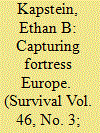

|
|
|
|
|
| Publication |
2004.
|
| Description |
p137-160
|
| Summary/Abstract |
By taking the route of international collaboration in developing and building its most advanced fighter aircraft, the Joint Strike Fighter (JSF), the US Department of Defense was seeking to ensure foreign market share, particularly in western Europe. Given the sharply falling weapons procurement budgets of the 1990s, these markets were deemed critical to the financial health of the American defence industrial base. The price of capturing those markets, however, could be high in terms of work-share and technology transfer to foreign industries and governments. The costs and benefits of international arms collaboration – specifically, the economic and security implications – need to be subject to more intensive policy analysis and public debate.
|
|
|
|
|
|
|
|
|
|
|
|
|
|
|
|
| 3 |
ID:
053638
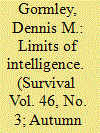

|
|
|
|
|
| Publication |
2004.
|
| Description |
p7-28
|
| Summary/Abstract |
In allocating blame for the intelligence failure over Iraq, critics of the Bush administration focus on former CIA Director George Tenet's bending to White House pressure or the administration's mishandling of intelligence. Supporters of the president downplay White House responsibility and focus instead on the failings of the intelligence community and the possible need for structural reforms. Neither side has it completely wrong – or right. There is substantial evidence that the Bush administration – like many of its predecessors – oversold the threat to sell its preferred policy choice. But any quest to ‘fix’ intelligence merely through reorganisation will be futile insofar as it avoids the more prosaic but more critical matter of intelligence effectiveness. This depends far less on structural reform than on the quality of collected intelligence, the nature of the analytic process and, ultimately, the relationship between intelligence and policymaking officials.
In allocating blame for the intelligence failure over Iraq, critics of the Bush administration focus on former CIA Director George Tenet's bending to White House pressure or the administration's mishandling of intelligence. Supporters of the president downplay White House responsibility and focus instead on the failings of the intelligence community and the possible need for structural reforms. Neither side has it completely wrong – or right. There is substantial evidence that the Bush administration – like many of its predecessors – oversold the threat to sell its preferred policy choice. But any quest to ‘fix’ intelligence merely through reorganisation will be futile insofar as it avoids the more prosaic but more critical matter of intelligence effectiveness. This depends far less on structural reform than on the quality of collected intelligence, the nature of the analytic process and, ultimately, the relationship between intelligence and policymaking officials.
In allocating blame for the intelligence failure over Iraq, critics of the Bush administration focus on former CIA Director George Tenet's bending to White House pressure or the administration's mishandling of intelligence. Supporters of the president downplay White House responsibility and focus instead on the failings of the intelligence community and the possible need for structural reforms. Neither side has it completely wrong – or right. There is substantial evidence that the Bush administration – like many of its predecessors – oversold the threat to sell its preferred policy choice. But any quest to ‘fix’ intelligence merely through reorganisation will be futile insofar as it avoids the more prosaic but more critical matter of intelligence effectiveness. This depends far less on structural reform than on the quality of collected intelligence, the nature of the analytic process and, ultimately, the relationship between intelligence and policymaking officials.
In allocating blame for the intelligence failure over Iraq, critics of the Bush administration focus on former CIA Director George Tenet's bending to White House pressure or the administration's mishandling of intelligence. Supporters of the president downplay White House responsibility and focus instead on the failings of the intelligence community and the possible need for structural reforms. Neither side has it completely wrong – or right. There is substantial evidence that the Bush administration – like many of its predecessors – oversold the threat to sell its preferred policy choice. But any quest to ‘fix’ intelligence merely through reorganisation will be futile insofar as it avoids the more prosaic but more critical matter of intelligence effectiveness. This depends far less on structural reform than on the quality of collected intelligence, the nature of the analytic process and, ultimately, the relationship between intelligence and policymaking officials.
In allocating blame for the intelligence failure over Iraq, critics of
|
|
|
|
|
|
|
|
|
|
|
|
|
|
|
|
| 4 |
ID:
053642
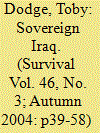

|
|
|
|
|
| Publication |
2004.
|
| Description |
p39-58
|
| Summary/Abstract |
The passing of UN Resolution 1546 and the granting of sovereignty to the Interim Iraqi Government were heralded in June 2004 as marking a watershed in both international and national attitudes to Iraq. In spite of the protracted negotiations in New York, the delivery of international legal sovereignty back to Baghdad was the most straightforward aspect of the whole Iraqi problem. Domestic sovereignty, the ability of the new Iraqi government to rule its population, is a long way off. The United States and the international community, through choice or necessity, will continue to be intimately involved in the day-to-day domestic politics of Iraq for many years to come.
|
|
|
|
|
|
|
|
|
|
|
|
|
|
|
|
| 5 |
ID:
053731
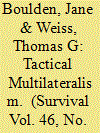

|
|
|
|
|
| Publication |
2004.
|
| Description |
p103-114
|
| Summary/Abstract |
The United Nations' and United States' responses to the events of 11 September and to Iraq reveal lessons and dilemmas for both. After a decade of having its legitimacy tested and undermined, the organisation is at a crossroads. The possible directions it can take are deeply influenced by US actions. For Washington, its use of the UN in the immediate aftermath of 11 September and its return to the organisation for help with post-war Iraq reveal an approach that continues a tradition of mixed messages at the UN. It is essential to facilitate this tactical multilateralism – a recognition of the importance of UN legitimacy and support to US interests – even though that recognition may constrain US actions and choices.
|
|
|
|
|
|
|
|
|
|
|
|
|
|
|
|
| 6 |
ID:
053729
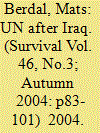

|
|
|
|
|
| Publication |
2004.
|
| Description |
p83-101
|
| Summary/Abstract |
The argument, widely made in the run-up to the war in Iraq, that the UN was on the verge of permanent marginalisation in the field of peace and security has turned out to be misplaced. The clearest sign of revitalisation has come not from its role in post-war Iraq but from the dramatic growth of UN peace operations in Africa since May 2003. While prophecies of doom may have been confounded, there is, within the Secretariat and among member states, still a deep sense that the war in Iraq ‘brought to the fore a host of questions of principle and practice’, whose implications have yet to be addressed. To do this, the Secretary General has set up a High-Level Panel on Threats, Challenges and Change, and indicated that ‘far-reaching institutional’ reform should be on the Panel's agenda. While references to institutional issues are politically unavoidable, the long-term value of the Panel's work will lie, more subtly, in its contribution to the quality of the discussion among member states about the threats and challenges facing them, not in proposals for radical Charter reform.
|
|
|
|
|
|
|
|
|
|
|
|
|
|
|
|
| 7 |
ID:
053732


|
|
|
|
|
| Publication |
2004.
|
| Description |
p115-135
|
| Summary/Abstract |
Relations between India and America have always been unsettled. Misunderstanding on both sides reached an apogee with India's 1998 nuclear tests. Despite a significant thaw towards the end of the Clinton administration, relations between the two countries have yet to stabilise, not least because of Indian unease over the post-11 September policies and strategies of the Bush administration, in particular, American support for Pakistan. In fact, the points of friction are more widespread, arising from the very different positions that India and America occupy in the international system. While the differences are not irreconcilable, expectations must be carefully managed. Both sides should work more strenuously to realise the strategic and moral implications of their desired alliance. Failing this, they may inadvertently sow further distrust.
|
|
|
|
|
|
|
|
|
|
|
|
|
|
|
|
| 8 |
ID:
053643


|
|
|
|
|
| Publication |
2004.
|
| Description |
p59-81
|
| Summary/Abstract |
No universally accepted practice currently governs the use of military force: states are going to war when they should not be, and not taking military action when they should. Available international law tools are not the problem: Chapter VII and Article 51 of the UN Charter, properly applied, between them enable the full range of necessary responses – both reactive and preventive – to all likely future security threats. What is needed, in the Security Council and elsewhere, is better process to maximise the chances of reaching consensus as to when it is right to fight. Five criteria of legitimacy should be accepted as guidelines in all cases: seriousness of threat, proper purpose, last resort, proportional means and balance of consequences.
|
|
|
|
|
|
|
|
|
|
|
|
|
|
|
|
|
|
|
|
|